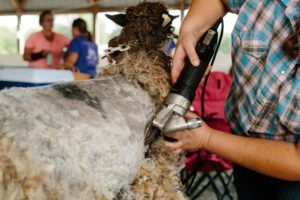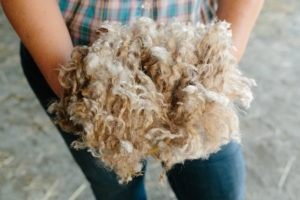
Dawn Christy Granja and her teenage daughter Emily pose with two of their sheep at the Christy family farm in Readington. Photo by Jauhien Sasnou
The pandemic affected many businesses in New Jersey—including sheep farmers.
Wool prices decreased during the shutdown because factories and retail shops were closed, and items made of wool, such as clothing, were not being produced.
Farmers still tended to their livestock, though. The rising prices of fermented hay and corn that sheep eat, along with the closure of agricultural fairs where sheep are sheared and sold, have caused difficulties for the farming industry.
Yet every spring, sheep need to be sheared. Last year, that meant heaps of wool were just being thrown into piles. Wool can grow anywhere from four to six inches a year, all the way up to 12 to 18 inches.

Dawn shears a sheep at the farm. Photo by Jauhien Sasnou
Dawn Christy Granja and her teenage daughter Emily shear sheep on the Christy family farm in Readington each spring. The family lost about $1,200 last year since they weren’t able to show their sheep at local fairs.
“We make our own hay, so we were able to survive, but many farms went out of business due to Covid-19,” says Dawn.
This year, things are looking brighter. Some of the fairs have re-opened, and consumers are once again eager to purchase firsthand wool and fresh lamb meat. In the coming months, New Jerseyans can attend events that feature sheep shearing including Mercer County Fair (July 30-31), Warren County Farmers Fair (July 30-August 6), Middlesex County Fair (August 1-7), Somerset County 4-H Fair (August 10-12), and the Hunterdon County 4-H Fair (August 24-28).

Wool can grow anywhere from four to six inches a year. Photo by Jauhien Sasnou
Sheep-shearing demonstrations are also taking place at farms across the state this spring, including Doyle’s Farm in Flemington, where Dawn works as an agricultural educator.
“I look at sheep as a wonder animal. We get wool, lanolin for our skin, milk for cheeses and meat for consumption,” Dawn says.
